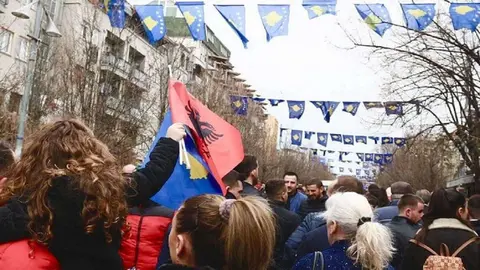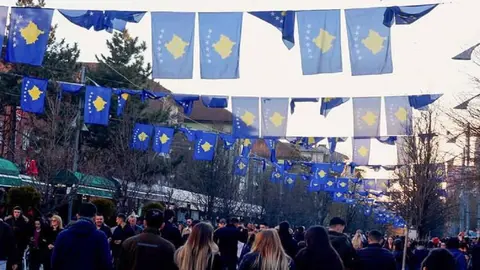What about the Kosovo Serbs

Ilir Peci, the arguably elected mayor of Zveçan, was sworn in last Thursday in Pristina's Parliament. The next day, as he was about to start his new working day, a crowd of Serbs met him at the gates of the town hall to prevent him from entering. Like him, Lulzim Hetemi in Leposavic and Erden Atic in North Mitrovica faced the same reception. Kosovar police forces were forced to disperse the then peaceful crowd, and the methods chosen by the security forces - mostly tear gas - were seen as a direct attack from Belgrade. In response, Serbian Interior Minister Aleksadar Vulin sent military forces to the Kosovo border.
After this, it seemed that tempers were calming down and that everything would remain a routine inter-communal clash in northern Kosovo. However, Monday's clashes led international forces, present in Kosovo since the self-proclamation of independence as KFOR, to intervene in clashes that have so far left dozens of military and protesters injured.
The north of Kosovo is the scene of recurrent incidents between the communities present in the territory; Serbs and Albanians. A situation that is only adding chapters to the never-ending story of the misconduct of both Pristina and Belgrade.

There were tensions last December, there were tensions last June and before that in March. We could go on and on until Kosovo's self-declaration of independence to find the reasons for these incidents. They all have the same origin, and it is not simply ethnic hatred, as one reads in social networks -especially in Spanish-.
Kosovo was back in the news a few months ago with what became known as the "number plate crisis". A situation that seemed to have calmed down after the EU-mediated meetings of the leaders of both countries in Ohrid (North Macedonia). However, nothing agreed in Ohrid has been implemented and the delicate situation of Serbs in Kosovo remains unresolved.
The attacks of the last few days, where both KFOR soldiers and Serb protesters have been injured, are a consequence of the election of the mayors of Serb municipalities in Kosovo; the latest bad decision leaving a stabilisation agreement between the two sides that has never been fulfilled.

In a café in northern Mitrovica, the young Kosovo Serb manager of the civil association 'New Social Initiative', Milica Andric, explains to me the reasons that have brought us to the situation we are in now: roads cut off, state institutions without Serb representation, attacks on borders and the official buildings of these municipalities, and populations increasingly at odds with each other. "For Kosovo Serbs, it's not just about number plates", she wants to make clear before she begins.
For what seems to have started with a change of number plates on cars, or in the pristine government's words, application of reciprocity measures, and has led to the situation we are in now, is nothing more than the result of both the Kosovo government's broken promises to the Serb minority, and Belgrade's continued use of this community for its own interests.
After the war in 1999, while in most of Kosovo the United Nations Interim Administration Mission in Kosovo (UNMIK) created temporary institutions in order to maintain stability in the territory, Serb-majority municipalities continued to use institutions linked to Belgrade. Once independence was declared in 2008, UNMIK institutions became Kosovar, which was not the case in Serb municipalities, where they remained accountable to Belgrade.
It was in 2011, when Serbia and Kosovo entered the EU-facilitated normalisation process, that it was agreed that the Belgrade government would work with Kosovo to integrate Serbian municipalities, especially those in the north, into the Kosovar system. In return, the new government in Pristina promised to create an Association of Serb-majority municipalities: a body that would have competencies in, among other things, education and health care.

Thus, in 2013, the so-called 'Agreement on Principles of Normalisation' was signed and, for the first time, Kosovo Serbs in the north would participate in Kosovo's elections, electing mayors and their representation in parliament within the Kosovar system. In addition, public officials from these municipalities would be integrated into the police, security and judiciary structures.
In practice, this meant that Serbian police officers were dismissed from the Serbian Ministry of Interior and began working for the Kosovo Ministry of Interior and were integrated into the Kosovo police force. The same happened to Serbian judges, prosecutors and administrative staff in the judicial institutions. In short, local assemblies, local administration, the judiciary and the Serb security structures that still functioned in Kosovo's municipalities were dissolved and integrated into the new state system.
In return for all this, as mentioned above, Kosovo was to establish the Association of Serbian Municipalities (AMS). This was never done, which caused the whole process to grind to a halt. Because of this, as Milica Andric explains to me, "our entire health and education system still only functions in the Serbian system. So we are kind of 'in between systems'". A limbo situation that has caused a system of parallel systems. "We have representatives of the municipality in the Serbian system and in the Kosovo system and, at one point, it happened that a mayor in the Kosovo system and a mayor in the Serbian system were the same person", which the young woman defines as "a kind of overlapping".

In Zvecan, medical staff attended yesterday's demonstration, wearing the gowns of their workplaces. A symbolic act that represents the situation of state staff in Serbian municipalities in northern Kosovo.
With regard to vehicle registration, this parallel system means that not all Serbs, especially in the northern municipalities, have Kosovar identification documents, because "this integration process is only halfway complete", explains Andric. With driving licences it's even worse, because not only can they not apply for them in the Kosovar system - as they are not registered in the Kosovar system - but there is no [driving] school that is authorised in the Kosovo system, meaning that everyone who passes the driving test in the north is registered [as a driver] only in the Serbian system and their driving licence would therefore be Serbian. This means that they cannot buy a car with Kosovar number plates.
This was supposedly settled last March at the so-called Ohrid meetings, where both sides pledged to "recognise official documents and national symbols, and respect independence, autonomy and territorial integrity, right to self-determination, protection of human rights and non-discrimination". This was seen as a 'de facto' recognition of Kosovo by Serbia. For its part, Pristina was also supposed to create the AMS. Nothing has been accomplished.
To try to summarise, the failure to create the Association of Serb Municipalities, as stipulated, and following tensions over the tuition crisis, Serb staff in Kosovo resigned en bloc from official institutions, including parliament and other governing bodies. This prompted the call for elections in the municipalities that had been left without representation, all of which were Serb-majority. However, since Pristina has failed to deliver on its promises, Serbs boycotted the elections, failing to put forward candidates or turn out to vote. The result was a turnout rate of just 3% and Albanians elected as mayors of Serb municipalities. These mayors were sworn in last Thursday and when they tried to enter the town halls on Friday, a mass of Serb citizens tried to prevent them from doing so as a sign of rejection of their - disputed - election. "We want these fake mayors who have been elected with less than 1% of the support to leave these buildings where they don't belong," declared the leader of the Serb community in Kosovo, Igor Simic, yesterday in Zvecan.

However, this is only one side of the coin. At the same time as these disturbances broke out, Serbian President Aleksandar Vucic was facing the largest protests against his government in history. Something that has not gone unnoticed in the area, and the phrase "Belgrade controls the Kosovo Serbs" is something that cannot go unheard when these incidents occur. It is something that is recurrent.
How Belgrade controls the Kosovo Serb community
I ask Milica about the national sentiment of Serbs in Kosovo, "most will tell you it's a fake state", she replies. "There is still a strong union or desire, especially in this [northern] region, to reintegrate into Serbia". The young woman tells me that, in the north of the country, independence "wasn't felt" until 2013.
As mentioned, Serbia had by then committed to assisting in the integration process of Serb-majority municipalities. However, most - if not all - Serb citizens in Kosovo did not agree to such integration, so the only way left for Serbia to do its part was to 'compensate' them.
By integrating into the Kosovar system, these [Serb] public officials were to be dismissed from the Serbian system and, according to the legal framework of the country [Serbia in this case], no one can be dismissed for a political reason, so Belgrade, to make them happy, awarded them a kind of 'pension'. Thus, Serbia pays public officials in these municipalities on a monthly basis in exchange for their integration into the kosovar system.This is what is hidden in the expression "Belgrade controls the Serb population of Kosovo". Something that is frequently used from Pristina, as evidenced by the tweet by Blerim Vela, chief of staff of Kosovo's president Vjosa Osmani, where he stated that "Serbia is coercing and inciting Kosovo Serbs to leave their jobs in Kosovo's institutions".

As Milica sums it up for me, "if Serbia does not put pressure on the community, either through intimidation or other means, to accept the [re-] registration, it cannot happen". Indeed, when in 2013 Serbia agreed to collaborate in this integration, the reality was that virtually no one in Kosovo's Serb-majority areas agreed. "In the 2013 elections there was strong opposition to integration in Kosovo; only 10-20% of people turned out. It was really a low turnout despite the intimidation that came from the Serb side," says Milica.
Just yesterday, during GLOBSEC 2023 in Bratislava, Kurti left the door open for new elections: "If they want peaceful protests, with a request for early elections, they have a prime minister who has been a political activist all his life and is more than willing to listen to them and maybe agree with them". While in a CNN interview the Serbian Prime Minister insisted on the creation of the Association of Serbian Municipalities.
The Kosovo Serb activist rightly states, "Kosovo is not aware of all these nuances that make integration not finalised, so they don't understand all the implications that this could entail". And in the face of this, barricades will be erected every so often, riots will continue to be a constant in the north, regional editorial offices will continue to write the same article about the same tensions over and over again, and what is even worse, the Serb community will continue to be the pawn in this game that has been dragging on for ten years and leaves no way out for reconciliation.










